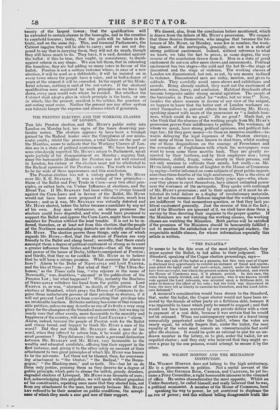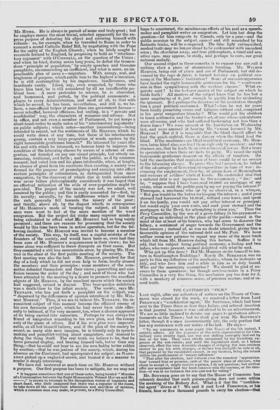MR. WILMOT HORTON AND THE MECHANICS' INSTITUTION.
Mn. WILMOT HORTON does not belong to the high aristocracy. He is a phenomenon in politics. Not a useful servant of the grandees, like GEORGE ROSE, CHOKER, and CANNING, he yet be- came a Privy Councillor, a right honourable labourer in the vineyard of office. He unites characteristics the most opposite. Whilst an Under-Secretary, he called himself, and really believed that he was, a political economist A member of the House of Commons, bent speaking his way to power, he yet contrived to displease the on rce of power; and this without telling disagreeable truth like speaking his way to power, he yet contrived to displease the on rce of power; and this without telling disagreeable truth like
Mr. Hume. He is always in pursuit of some end truly great ; but he employs means the most trivial; selected apparently for the ex- press purpose of defeating his object and covering himself with ridicule : as, for example, when he travelled to Rome in order to concoct a sound Catholic Relief Bill, by negotiating with the Pope
for the safety of the English Church; when he lately sought to reconcile Ireland to England, by proposing to hold an " interlocu- tory argument" with O'CONNELL, on the question of the Union ; and when he tried, during seven long years, to defeat the tremen- dous " principle of population," by empty speeches and tiresome pamphlets, recommending an inefficient, and what is more, an im- practicable plan of mere e—migration. With energy, zeal, and singleness of purpose, which entitle him to the highest admiration, he is still contemptible by his impotence, heedlessness, and inordinate vanity. Liked, nay, even respected, by those who know him best, he is still considered by all an insufferable po- litical bore. 1A. mere pretender to science, he is cherished, and humoured, and petted,. by the political economists: a plague to every Administration, and most of all, to that with which he served, he has been, nevertheless, and still is, we be- lieve, a non-official helper at more than one government bureau— never rebuffed, however officious, but uniting, in a "private and confidential" way, the characters of nuisance and adviser. Not in office, and not even a member of Parliament, he yet keeps a short-hand-writer to make notes of his "interlocutory arguments" on public subjects ; which notes—another inconsistency—being intended to record, not the sentiments of Mr. HORTON, which lie could write down at any time, but those of his interlocutory gossip, contain a very large proportion of words spoken by the right honourable gentleman himself.* He laboured for years (for the zeal with which he laboured, we honour him) to improve the condition of the labouring classes by means of a scheme of emi- gration, not founded on any one sound principle, but utterly un- meaning, irrational, and futile ; and the public, as if by common consent, had voted him and his plans intolerable, when, at length, no chance of good from his exertions then existing, a society was formed for the purpose of promulgating and carrying into effect certain principles of colonization, as distinguished from mere emigration, by the discovery of which (for in truth colonization was never before philosophically considered) it was hoped that an effectual mitigation of the evils of over-population might be provided. The project of the society was not, we admit, well received by the public ; and this is easily accounted for—first, by its novelty; secondly, by the indifference which at that time the rich generally felt towards the misery of the poor ; and thirdly, above all, by the disgust which, in consequence of Mr. HORTON.S mode of treating the subject, all kinds of men were wont to feel at the mere mention of the word emigration. But the project did strike many superior minds as being calculated to effect what Mr. HORTON had so long vainly promised ; and there are reasons for presuming that the society would by this time have been in active operation, but for the fol- lowing incident. Mr. Horcroi was invited to become a member of the society. This step, by itself, was a capital mistake of the founders of the society, and would have been so, even had they been sure of Mr. HORTON'S acquiescence in their views ; for his name alone was sufficient to throw disrepute on their cause. But they committed a still less accountable error, by placing Mr. Host- TON in the chair at the first public meeting of the society. The first meeting was also the last. Mr. HORTON, president for that
day of a body which he did not even help to form, loudly abused the members and their principles : some members of the com- mittee defended themselves and their views ; quarrelling and con- fusion became the order of the day ; and most of those who had
been attracted to the meeting by a desire to promote the excellent objects of Mr. HORTON, by the excellent means which the society
had suggested, retired in disgust. This bear-garden exhibition
was a death-blow to the infant society. The society, says Mr. TENNANT, who has put forth a pamphlet on the subject, was
"dispersed by the differences of opinion introduced by Mr. Wm-
WOT HORTON:' Thus, if we are to believe Mr. TENNANT, the in- consistent subject of this memoir became the efficient enemy of
his own favourite project, which he had never been able effici- ently to befriend, at the very moment, too, when a chance appeared of its being carried into execution. Perhaps he was always the friend of emigration according to his own plan, and the enemy only of the plans of others. But if his own plan were impracti- cable, as all but himself believe, and if the plan of the society be sound, as many able men imagine, he is friendly only to speech- making and pamphlet-writing about emigration, and inimical to doing the thing itself. The real truth we believe to be, that he loves personal display, and hearing himself talk, better than any thing,—that he could not bear to see his own hobby better ridden by another,—that he was jealous of the society, which, during his
absence on the Continent, had appropriated his subject, as NAPO- LEON picked up a neglected crown, and treated it in a manner to render it deeply interesting. We have not bestowed so much time on Mr. HORTON without a purpose. Our first purpose has been to mitigate, for we may not * It happens sometimes that one of these notes, being headed "Minutes of a Conversation between the Right Honourable Wilmot Horton and Mr. ," is shown in triumph to the thoughtless victim of loquacity and short-hand, who little imagined that there was a reporter in the room, to take down all the subservient admissions and sacrifices of opinion, which a common man may make, in private, to a Privy Councillor. hope to counteract, the mischievous effects of his zeal as a speech- maker and pamphlet-writer on emigration. Let him but drop the
question—let him emigrate to Canada, only for a year—and the public aversion to the subject, caused and still nourished by his fantastic tricks, will be conquered. The false light extinguished,
modest truth may no loner dread to be confounded with impudent error; the charlatan away, and true philosophers, a timid and sen- sitive race, may appear, to study, and perhaps to cure, our great national malady. Our second object in these remarks is to expose (we can call it nothing else) a piece of abominable humbug. Mr. WILMOT HORTON, being out of place and out of Parliament, hut still de- voured by the rage de faire, is turned lecturer on political eco- nomy at the Mechanics' Institution ! Som.! of our contemporaries have lauded the right honourable gentleman for his " condescen-
sion in thus sympathizing with the working classes." What ex- quisite cant ! Is the lecturer master of the subject on which he
holds forth? All masters of the subject know that he has but a mere smattering of it, just enough to qualify him for misleading the ignorant. But perhaps the directors of the institution thought him a good political economist. What !—has he not for years been loudly preaching errors and fallacies without end, comprised in his great emigration blunder ? Who would put his children to learn arithmetic and the trailer's art, of one whose calculations were all wrong, and who had suffered bankruptcy not less than a dozen times ? We were present at this Institution on Wednesday last, anti were amused at hearing Mr. :ENIOR lectured by Mr. Hcarrox ! But if it is laughable that the blind should affect to lead the quick-sighted, there is thurxer when the blind lead the blind. If the mechanics are blind in political economy, Mr. HOR- TON, being blind also, can lead them right only by accident ; and the chances are, that he leads thou into athousa.od errors. But a truce to speculation when there are filets to go by. We heard the right honourable gentleman descant on the effects of taxation. He told the mechanics that remission of taxes could be or no service to the labouring classes. To limy,' this boll assertion, he talked of the advantages of Govern in Alt expenditure in time of war ; in- stancing the employment, theniby, of gumnakers at Birmingham and weavers of soldiers' cloth at Leeds. He contended also that a national debt is not injurious to the community ; " for," said he, " suppose that I have borrowed lo,000/. on mortgage of my estate, what would the public gain by my not paying the interest ?" Thereupon, a mechanic who sat by us observed, in a whisper, "But you would be the better for keeping the interest ; and if your steward had borrowed the 10,0(W., without your leave, and spent it on his family, you would not pay either interest or principal: but would enjoy your own rents, and send your steward and the mortgagee to the Devil, for attempting to cheat you." Thus the Privy Councillor, by the use of a gross fallacy in his argument— of putting an individual in the place of the public—raised in the mind of one at least of his hearers, who had sense to discover the fallacy, a sentiment of anger towards the Government and the fund-owners ; instead of, as was no doubt intended, giving him a favourable opinion of the national debt and Mr. PITT. We have neither room nor patience to repeat any more of the mere trash which fell from Mr. HORTON during this lecture. Suffice it to add, that his subject being political economy, a bishop and two ladies, who were present, seemed delighted with what he said. Who got up this farce ? Did Mr. HORTON invite himself to lec- ture in Southampton Buildings ? Surely Dr. BIRKBECK was no party to this mystification of the mechanics, whom he instructs so ably, and who love him and ctnfide in him as in duty bound. Who are" the managing committee ? We should be glad of an- swers to these questions; for though condescension in a Privy Councillor is a very fine thing, the mechanics pay too dear for it, with a mockery of common sense, of precious science, and of sa- cred truth.



























 Previous page
Previous page